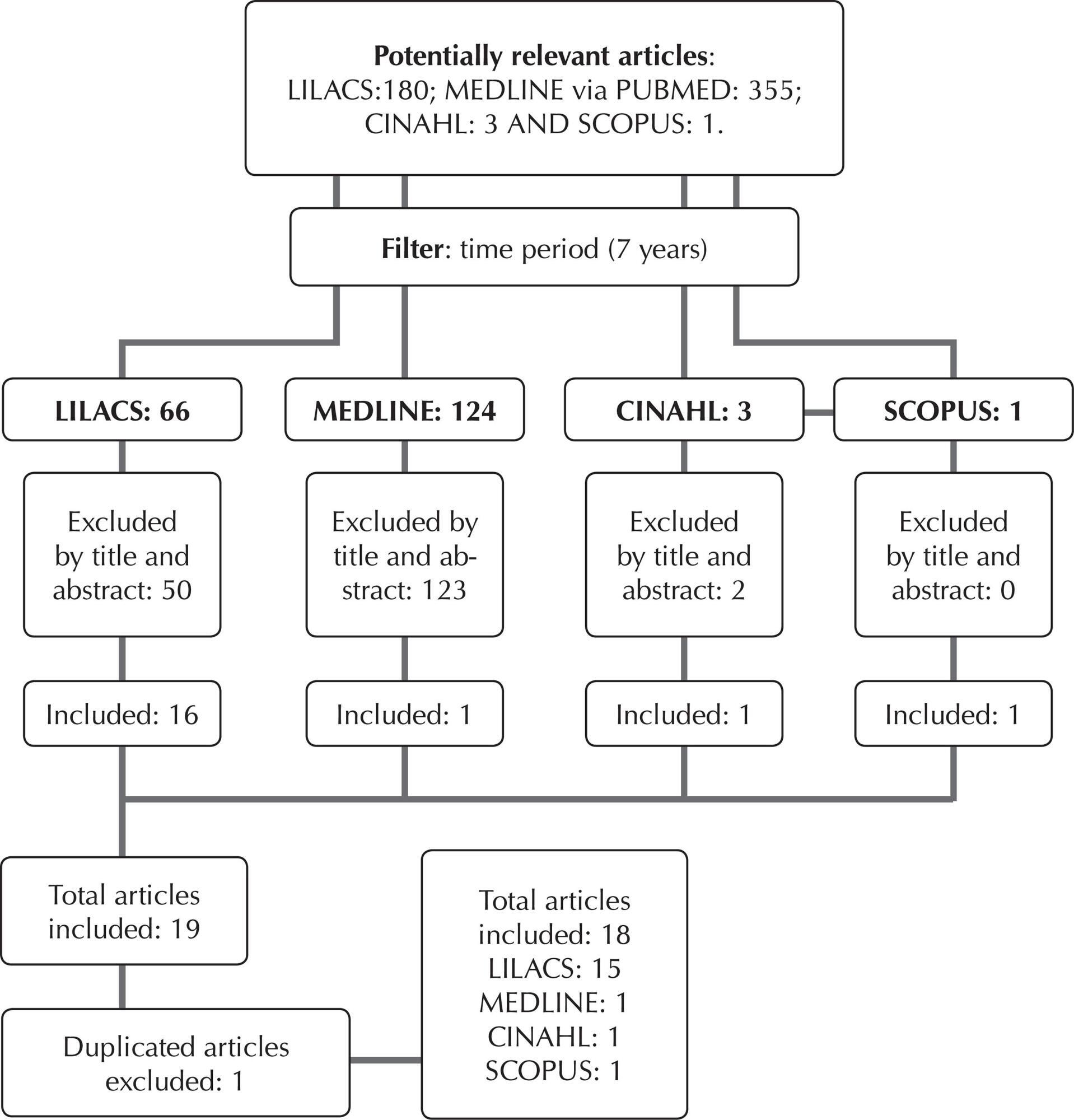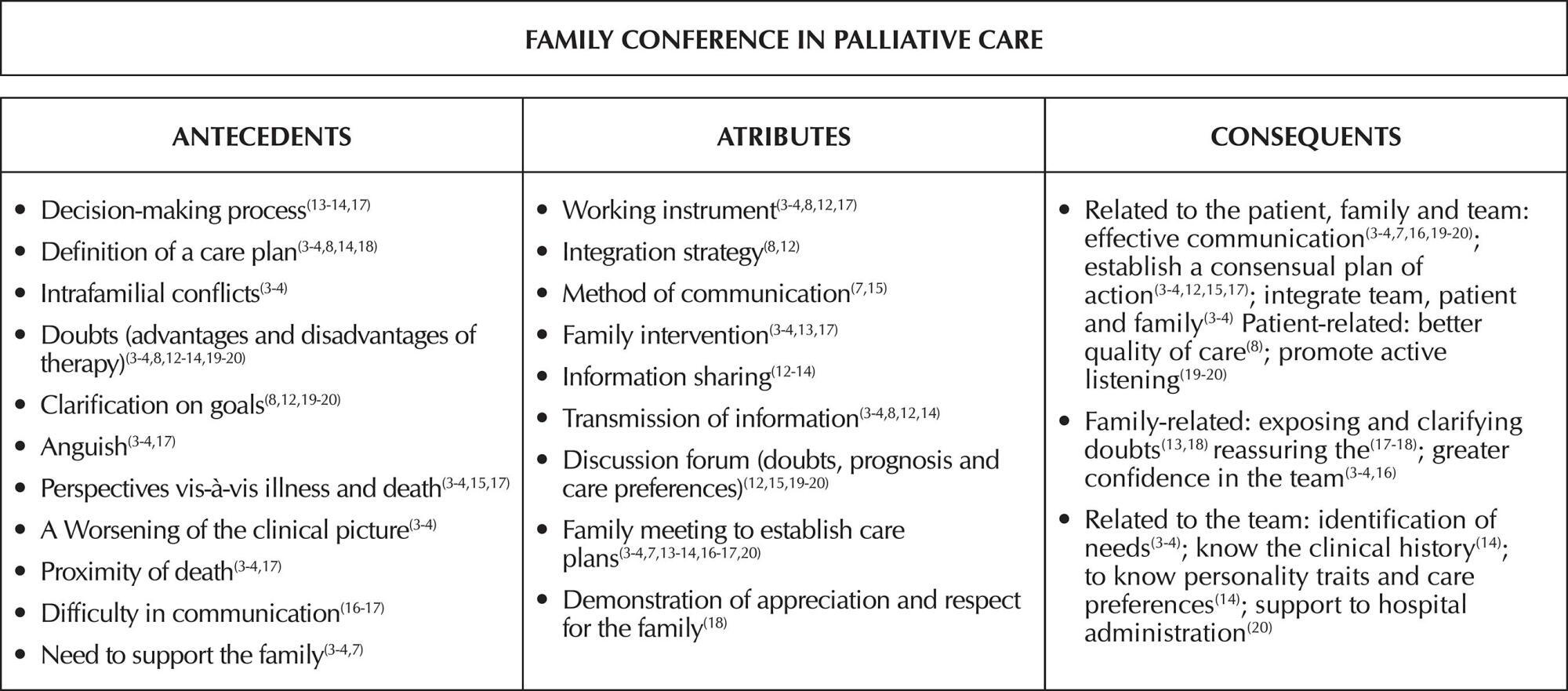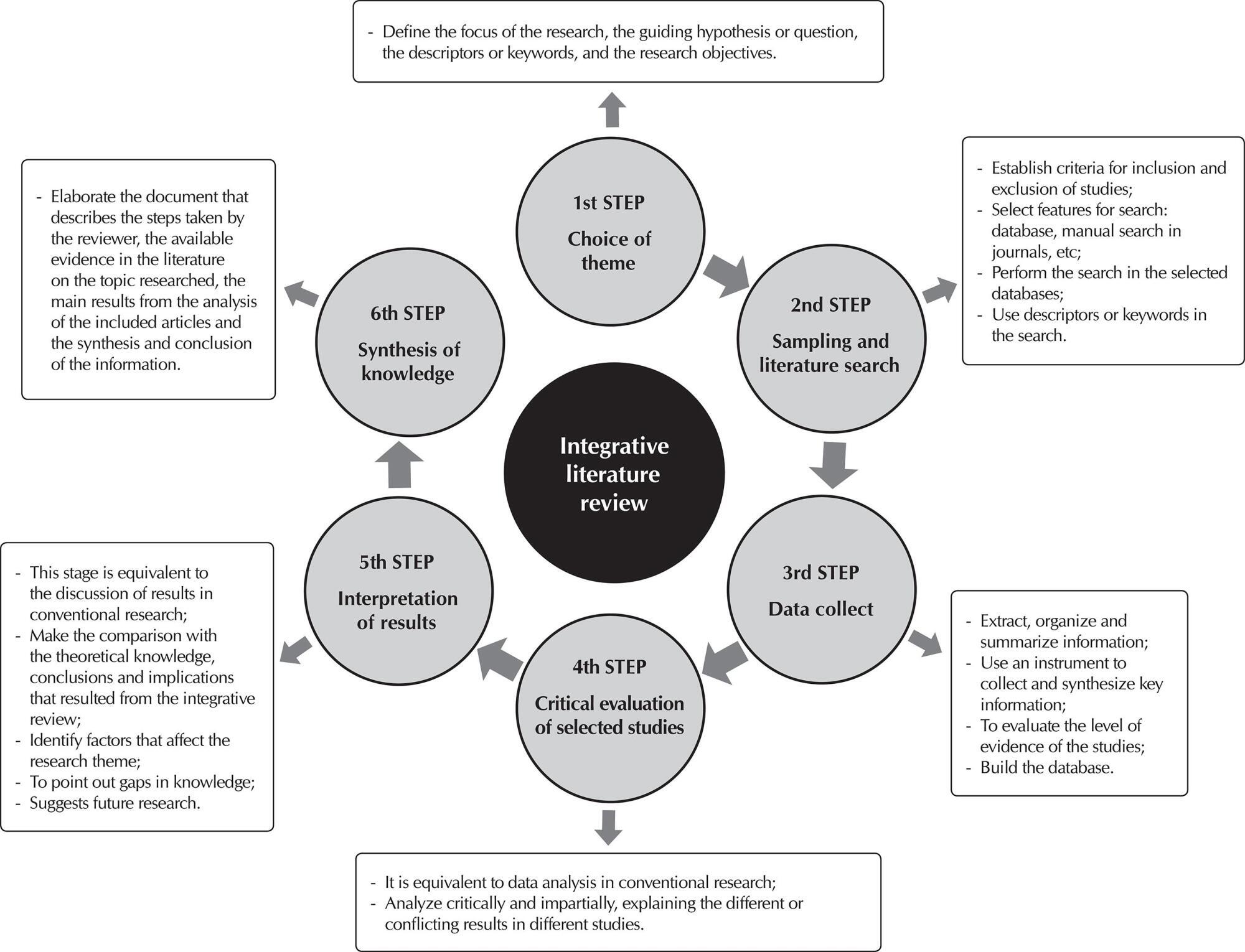-
RESEARCH01-01-2018
Primary care assessment from a male population perspective
Revista Brasileira de Enfermagem. 2018;71(2):236-243
Abstract
RESEARCHPrimary care assessment from a male population perspective
Revista Brasileira de Enfermagem. 2018;71(2):236-243
DOI 10.1590/0034-7167-2016-0651
Views1See moreABSTRACT
Objective:
to evaluate the quality of primary health care from the perspective of the male population.
Method:
a cross-sectional descriptive-evaluative study conducted at the family health units of Teresina, Piauí, Brazil, with the male population being interviewed through the Primary Care Assessment Tool (PCAT).
Results:
301 participants with mean age of 51.34 years, married, incomplete elementary school and monthly income between one and two minimum wages. The evaluation was positive for the following care domains: utilization, information system and longitudinality. The features access, comprehensiveness of care, service available and service provided, family centeredness and community orientation obtained a negative evaluation.
Conclusion:
the features of primary care are unsatisfactory, indicating the need to expand access to services offered and to qualify care for male users.
-
01-01-2018
Family and crisis: contributions of the systemic thinking for family care
Revista Brasileira de Enfermagem. 2018;71(2):234-235
Abstract
Family and crisis: contributions of the systemic thinking for family care
Revista Brasileira de Enfermagem. 2018;71(2):234-235
DOI 10.1590/0034-7167.2018710201
Views0The noun crisis comes from the Greek etymology, which means a dramatic change in a person’s or group’s life, as the familiar. It can also be perceived as a biological, social, psychological or spiritual disturbing tension that requires additional effort in order to maintain the balance(–).Families at different life cycle stages, from different configurations, and […]See more -
01-01-2018
Família e crise: contribuições do pensamento sistêmico para o cuidado familiar
Revista Brasileira de Enfermagem. 2018;71(2):234-235
Abstract
Família e crise: contribuições do pensamento sistêmico para o cuidado familiar
Revista Brasileira de Enfermagem. 2018;71(2):234-235
DOI 10.1590/0034-7167.2018710201
Views0Crise é um substantivo de etimologia grega, que pode ser explicada como sendo uma mudança brusca em algum dos aspectos da vida de uma pessoa, ou de um grupo, como o familiar. Também pode ser entendida como uma tensão perturbadora de ordem biológica, social, psíquica ou espiritual, que exige um esforço complementar para a manutenção […]See more -
EXPERIENCE REPORT01-01-2018
Theoretical saturation in qualitative research: an experience report in interview with schoolchildren
Revista Brasileira de Enfermagem. 2018;71(1):228-233
Abstract
EXPERIENCE REPORTTheoretical saturation in qualitative research: an experience report in interview with schoolchildren
Revista Brasileira de Enfermagem. 2018;71(1):228-233
DOI 10.1590/0034-7167-2016-0616
Views0See moreABSTRACT
Objective:
report the experience of applying the theoretical data saturation technique in qualitative research with schoolchildren.
Method:
critical reading of primary sources and compilation of raw data, followed by thematic grouping through colorimetric codification and allocation of themes/types of statements in charts to find theoretical saturation for each grouping.
Results:
colorimetric codification occurred according to previously established themes: bodily hydration; physical activities and play; handling of sickle-cell disease; feeding and clothing. On the eleventh interview, it was possible to reach the theoretical saturation of themes, with four additional interviews being performed.
Conclusion:
this experience report enabled the description of the five sequential steps for identification of theoretical data saturation in qualitative research conducted with schoolchildren.
-
EXPERIENCE REPORT01-01-2018
Advanced Practice Nursing in Pediatric Urology: experience report in the Federal District
Revista Brasileira de Enfermagem. 2018;71(1):223-227
Abstract
EXPERIENCE REPORTAdvanced Practice Nursing in Pediatric Urology: experience report in the Federal District
Revista Brasileira de Enfermagem. 2018;71(1):223-227
DOI 10.1590/0034-7167-2016-0654
Views0See moreABSTRACT
Objective:
To describe the creation and implementation of the extension program Advanced Practice Nursing in Pediatric Urology, developed in the outpatient clinic of a teaching hospital in the Federal District.
Method:
This is an experience report regarding the implementation of an outpatient service aimed at children and adolescents with symptoms of bladder and bowel dysfunction.
Results:
Because it is an extension program linked to the university, it follows a different model of care, valuing empowerment, informed and shared decision making, which results in a stronger bond between patients, family and the Pediatric Urology nursing team. It has also become a privileged space for the production and use of scientific knowledge, associated with the principles of evidence-based practice.
Conclusion:
This project shows a different performance of the nurse-specialist-professor-researcher in Pediatric Urology Nursing, and it has become a reference in the Federal District, mainly for undergraduate and graduate nursing students.
-
REVIEW01-01-2018
Analysis of Brazilian publications on distance education in nursing: integrative review
Revista Brasileira de Enfermagem. 2018;71(1):214-222
Abstract
REVIEWAnalysis of Brazilian publications on distance education in nursing: integrative review
Revista Brasileira de Enfermagem. 2018;71(1):214-222
DOI 10.1590/0034-7167-2016-0454
Views0INTRODUCTIONDistance Education (DE) is characterized by a teaching-learning process in which the relationship between teacher and student does not occur on physical plane. This strategy, besides allowing the use of technologies in education, stimulates multidirectional communication and the exchange of experiences/knowledge among the related subjects, while always aiming at the student as protagonist and the […]See more
-
REVIEW01-01-2018
Family conference in palliative care: concept analysis
Revista Brasileira de Enfermagem. 2018;71(1):206-213
Abstract
REVIEWFamily conference in palliative care: concept analysis
Revista Brasileira de Enfermagem. 2018;71(1):206-213
DOI 10.1590/0034-7167-2016-0055
Views0See moreABSTRACT
Objective:
to analyze the attributes, antecedents and consequents of the family conference concept.
Method:
Walker and Avante’s method for concept analysis and the stages of the integrative review process, with a selection of publications in the PubMed, Cinahl and Lilacs databases focusing on the family conference theme in the context of palliative care.
Results:
the most cited antecedents were the presence of doubts and the need to define a care plan. Family reunion and working instrument were evidenced as attributes. With respect to consequents, to promote the effective communication and to establish a plan of consensual action were the most remarkable elements.
Final considerations:
the scarcity of publications on the subject was observed, as well as and the limitation of the empirical studies to the space of intensive therapy. Thus, by analyzing the attributes, antecedents and consequents of the concept it was possible to follow their evolution and to show their efficacy and effectiveness as a therapeutic intervention.

-
REVIEW01-01-2018
Quality of life in adults with sickle cell disease: an integrative review of the literature
Revista Brasileira de Enfermagem. 2018;71(1):195-205
Abstract
REVIEWQuality of life in adults with sickle cell disease: an integrative review of the literature
Revista Brasileira de Enfermagem. 2018;71(1):195-205
DOI 10.1590/0034-7167-2016-0409
Views0See moreABSTRACT
Objective:
To identify the available evidence in the literature on health-related quality of life in adults with sickle cell disease.
Method:
integrative review of MEDLINE, CUMED, LILACS and SciELO databases, from articles developed in this area, published between 2005 and 2015, in English, Portuguese or Spanish.
Results:
22 articles were included, six scales were used to evaluate health-related quality of life scores: three generic and three specific. No specific scale for adults with sickle cell disease has been adapted to Brazilian Portuguese so far. Patients affected by frequent painful crises, with low adherence to treatment, had a compromised quality of life.
Conclusion:
Selected studies have shown that patients with sickle cell disease have worse scores than the general population. These indicators should be instrumental to the nurse in the proposal of interventions and strategies of assistance and socio-educational, with a view to improving the quality of life of this clientele.

-
ORIGINAL ARTICLE04-09-2020
High-risk areas of leprosy in Brazil between 2001-2015
Revista Brasileira de Enfermagem. 2020;73(3):e20180583
Abstract
ORIGINAL ARTICLEHigh-risk areas of leprosy in Brazil between 2001-2015
Revista Brasileira de Enfermagem. 2020;73(3):e20180583
DOI 10.1590/0034-7167-2018-0583
Views0See moreABSTRACT
Objectives:
to identify high-risk areas of leprosy in Brazil from 2001 to 2015.
Methods:
this is an ecological study of spatial analysis based on Brazilian municipalities. Spatial scan statistics were used to identify spatial clustering and measure the relative risk from the annual detection rate of new cases of leprosy. By criterion based on the Gini index, only secondary clusters were considered.
Results:
spatial scan statistics detected 26 clusters, in which the detection rate was 59.19 cases per 100 thousand inhabitants, while in the remainder of the country it was 11.76. Large part of the cluster area is located in the Legal Amazon. These groups included only 21.34% of the total population, but 60.40% of the new cases of the disease.
Conclusions:
Leprosy remains concentrated in some areas, showing the need for control programs to intensify actions in these municipalities.

-
REVIEW04-16-2021
Clinical outcomes of patient navigation performed by nurses in the oncology setting: an integrative review
Revista Brasileira de Enfermagem. 2021;74(2):e20190804
Abstract
REVIEWClinical outcomes of patient navigation performed by nurses in the oncology setting: an integrative review
Revista Brasileira de Enfermagem. 2021;74(2):e20190804
DOI 10.1590/0034-7167-2019-0804
Views0See moreABSTRACT
Objective:
to evidence the clinical outcomes of navigation performed by nurses in cancer patients.
Methods:
this is an integrative literature review with collection in MEDLINE via PUBMED, LILACS, Web of Science, Scopus, and CINAHL databases. The final sample consisted of seven studies. The data were analyzed and presented descriptively. Data related to clinical outcomes were compiled and described in full. The Agency for Healthcare Research and Quality categorization was used to assess the level of evidence.
Results:
the clinical outcomes demonstrated were decreased distress, anxiety and depression, improved control and management of symptoms, improved physical conditioning, improved quality and continuity of care, improved quality of life, reduced time to start treatment.
Final considerations:
there is research that shows better clinical outcomes in cancer patients through navigation by nurses across the continuum of health care.

-
ORIGINAL ARTICLE12-13-2019
Perceptions and expectations of pregnant women about the type of birth
Revista Brasileira de Enfermagem. 2019;72:41-49
Abstract
ORIGINAL ARTICLEPerceptions and expectations of pregnant women about the type of birth
Revista Brasileira de Enfermagem. 2019;72:41-49
DOI 10.1590/0034-7167-2017-0731
Views0See moreABSTRACT
Objective:
to understand the perceptions and expectations of pregnant women about the type of birth.
Method:
this is a qualitative research, based on the assumptions of the Humanization of Obstetric Care. 15 pregnant women were interviewed twice at the beginning and the end of gestation between October 2015 and May 2016. Data were analyzed according to the method of the Discourse of the Collective Subject.
Results:
the discourses were associated with four themes: Advantages of vaginal birth over cesarean section; Fear and unpredictability of vaginal birth; Importance of the doctor in the definition of the type of birth; and Influence of family and friends in choosing the type of birth.
Final considerations:
according to pregnant women, vaginal birth has more benefit compared to cesarean section. However, during gestation and birth, fear of pain and the unexpected, and medical opinions of friends and family against vaginal birth strongly influence the choice of cesarean section.
-
REVIEW09-30-2020
Telenursing in care, education and management in Latin America and the Caribbean: an integrative review
Revista Brasileira de Enfermagem. 2020;73:e20190317
Abstract
REVIEWTelenursing in care, education and management in Latin America and the Caribbean: an integrative review
Revista Brasileira de Enfermagem. 2020;73:e20190317
DOI 10.1590/0034-7167-2019-0317
Views0See moreABSTRACT
Objective:
Analyze the knowledge generated about telenursing related to the roles of nurses (care, education and management) in Latin America and the Caribbean, based on scientific evidence.
Methods:
Integrative review, for the years 2009 to 2019, in scientific databases from Latin America and the Caribbean. Twelve articles were selected.
Results:
Nine studies focused on care and three on education. The information and communication technology used in the studies was telephony directed toward non-communicable diseases. There were concerns about the remote communication process. With respect to education, two focused on educating health teams and one on educating patients.
Conclusion:
It is necessary to conduct studies on telenursing that generate changes in care practices, explore information and communication technology resources and provide communication training focused on this new care model.

-
REVIEW08-14-2020
Nursing practice environment in Primary Health Care: a scoping review
Revista Brasileira de Enfermagem. 2020;73(6):e20190479
Abstract
REVIEWNursing practice environment in Primary Health Care: a scoping review
Revista Brasileira de Enfermagem. 2020;73(6):e20190479
DOI 10.1590/0034-7167-2019-0479
Views0INTRODUCTIONKnowledge and scientific evidence about nursing practice environments (NPE) in the context of Primary Health Care (PHC) is scarce.Policy makers, health and professional organizations have proposed to redesign the health system in PHC with the aim of increasing citizens’ accessibility, improving customer outcomes and maximizing efficiency. […]See more
-
ORIGINAL ARTICLE08-19-2019
Interruptions and nursing workload during medication administration process
Revista Brasileira de Enfermagem. 2019;72(4):1001-1006
Abstract
ORIGINAL ARTICLEInterruptions and nursing workload during medication administration process
Revista Brasileira de Enfermagem. 2019;72(4):1001-1006
DOI 10.1590/0034-7167-2018-0680
Views0See moreABSTRACT
Objective:
To investigate the sources and causes of interruptions during the medication administration process performed by a nursing team and measure its frequency, duration and impact on the team’s workload.
Métodos:
This is an observational study that timed 121 medication rounds (preparation, administration and documentation) performed by 15 nurses and nine nursing technicians in a Neonatal Intensive Care Unit in the countryside of the state of São Paulo.
Resultados:
63 (52.1%) interruptions were observed. In each round, the number of interruptions that happened ranged from 1-7, for 127 in total; these occurred mainly during the preparation phase, 97 (76.4%). The main interruption sources were: nursing staff – 48 (37.8%) − and self-interruptions – 29 (22.8%). The main causes were: information exchanges – 54 (42.5%) − and parallel conversations – 28 (22%). The increase in the mean time ranged from 53.7 to 64.3% (preparation) and from 18.3 to 19.2% (administration) – p≤0.05.
Conclusão:
Interruptions in the medication process are frequent, interfere in the workload of the nursing team and may reflect on the safety of care.
-
ORIGINAL ARTICLE06-29-2020
Personal Protective Equipment in the coronavirus pandemic: training with Rapid Cycle Deliberate Practice
Revista Brasileira de Enfermagem. 2020;73:e20200303
Abstract
ORIGINAL ARTICLEPersonal Protective Equipment in the coronavirus pandemic: training with Rapid Cycle Deliberate Practice
Revista Brasileira de Enfermagem. 2020;73:e20200303
DOI 10.1590/0034-7167-2020-0303
Views0See moreABSTRACT
Objective:
to discuss the application of Rapid Cycle Deliberate Practice for attire and unattire training in the context of COVID-19 and structure a practical guide to the application at this juncture.
Methods:
this methodological study described theoretical and practical aspects of the application of a simulation strategy as a technological training tool. An application guide was constructed from the search for evidence from the main health authority bodies in Brazil.
Results:
maximizing time in Deliberate Practice, feedback with evidence and psychological security are the principles of this strategy. The dynamic involves repetition and feedback. The application guide presents the sequence of actions for attire and unattire.
Final considerations:
coping with this pandemic requires appropriate use of personal protective equipment. The authors suggest the Rapid Cycle Deliberate Practice as a technological educational tool for attire/unattire, since it encourages mastery performance.

-
REVIEW06-11-2021
Mental health interventions implemented in the COVID-19 pandemic: what is the evidence?
Revista Brasileira de Enfermagem. 2021;74:e20200635
Abstract
REVIEWMental health interventions implemented in the COVID-19 pandemic: what is the evidence?
Revista Brasileira de Enfermagem. 2021;74:e20200635
DOI 10.1590/0034-7167-2020-0635
Views0See moreABSTRACT
Objective:
to map the evidence on mental health interventions implemented during the COVID-19 pandemic.
Method:
this scoping review was carried out in the MEDLINE/PubMed, SCOPUS, Web of Science, PsycINFO, and Science Direct databases and in the medRxiv, bioRxiv, and PsyArXiv preprints servers using the descriptors “Covid-19”, “coronavirus infection”, “coronavirus”, “2019-nCoV”, “2019 novel coronavirus disease”, “SARS-CoV-2”, “health personnel”, “general public”, and “mental health”.
Results:
eight articles were selected and categorized into mental health interventions for the population, among which mental health interventions were for people diagnosed with suspicion/confirmed COVID-19 and mental health interventions for health professionals.
Conclusion:
telemonitoring, virtual games and strategies focused on social support and muscle relaxation techniques, characterized as non-pharmacological and low-cost, were shown as interventions, which, since they are effective, need to be encouraged and included in mental health care practices.

Search
Search in:
Nuvem de Tags
Adolescente (85) Atenção Primária à Saúde (239) COVID-19 (91) Criança (91) Cuidados de Enfermagem (269) Educação em Enfermagem (151) Educação em Saúde (139) Enfermagem (930) Enfermagem Pediátrica (86) Estudantes de Enfermagem (77) Estudos de Validação (131) Família (87) Idoso (208) Promoção da Saúde (99) Qualidade de Vida (104) Saúde do Trabalhador (86) Saúde Mental (145) Saúde Pública (82) Segurança do Paciente (150) Tecnologia Educacional (100)



